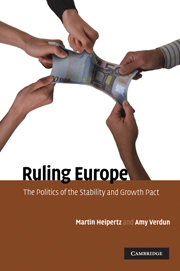Book contents
- Frontmatter
- Contents
- List of tables
- Foreword by Jean-Claude Juncker, Prime Minister of Luxembourg and President of the Eurogroup
- Preface
- Acknowledgements
- List of abbreviations
- 1 The politics of the Stability and Growth Pact
- Part I
- 2 States, intergovernmentalism and negotiating the SGP
- 3 Opening the box: A domestic politics approach to the SGP
- 4 The functional logic behind the SGP
- 5 The role of experts and ideas
- Part II
- Appendix
- Bibliography
- Index
2 - States, intergovernmentalism and negotiating the SGP
Published online by Cambridge University Press: 06 July 2010
- Frontmatter
- Contents
- List of tables
- Foreword by Jean-Claude Juncker, Prime Minister of Luxembourg and President of the Eurogroup
- Preface
- Acknowledgements
- List of abbreviations
- 1 The politics of the Stability and Growth Pact
- Part I
- 2 States, intergovernmentalism and negotiating the SGP
- 3 Opening the box: A domestic politics approach to the SGP
- 4 The functional logic behind the SGP
- 5 The role of experts and ideas
- Part II
- Appendix
- Bibliography
- Index
Summary
Presenting intergovernmentalism
Classical European integration theories aimed to explain the phenomenon of integration by focusing on various actors and mechanisms in the integration process. The intergovernmentalist approach formulated in the mid-1960s (Hoffmann 1966) was a realist response to neofunctionalism. Intergovernmentalism argues that national governments are the key actors that determine integration. In other words, whether integration occurs depends on whether or not it is in the interest of national governments. For his theoretical approach Stanley Hoffmann relied on the personality and the euro-sceptic stance of Charles de Gaulle. In the 1960s, the French President had been largely opposed to transferring power to supranational institutions. Thus, Hoffmann concluded, one should look at state interests to explain integration. However, Hoffmann's approach did not clarify how one could identify and enlighten the notion of state interest itself. Twenty-five years later, Moravcsik (1991) opened the ‘black box’ of the state and incorporated the national economic features and priorities of a country as variables that determine ‘national state interests’ as far as European integration is concerned. Though Moravcsik was able to make the overall approach subtler, his liberal intergovernmentalist approach still mainly considers state interests and hence interstate bargaining as key to understanding European integration (Moravcsik 1993, 1998).
Because national governments are the most important actors in this view, most of the integration decisions occur in intergovernmental bargaining arenas, such as the European Council Summits, the Meetings of Council of the EU and other similar scenes, primarily intergovernmental conferences and, to a lesser extent, (intergovernmental) committees that prepare the work of the Council.
- Type
- Chapter
- Information
- Ruling EuropeThe Politics of the Stability and Growth Pact, pp. 19 - 41Publisher: Cambridge University PressPrint publication year: 2010



